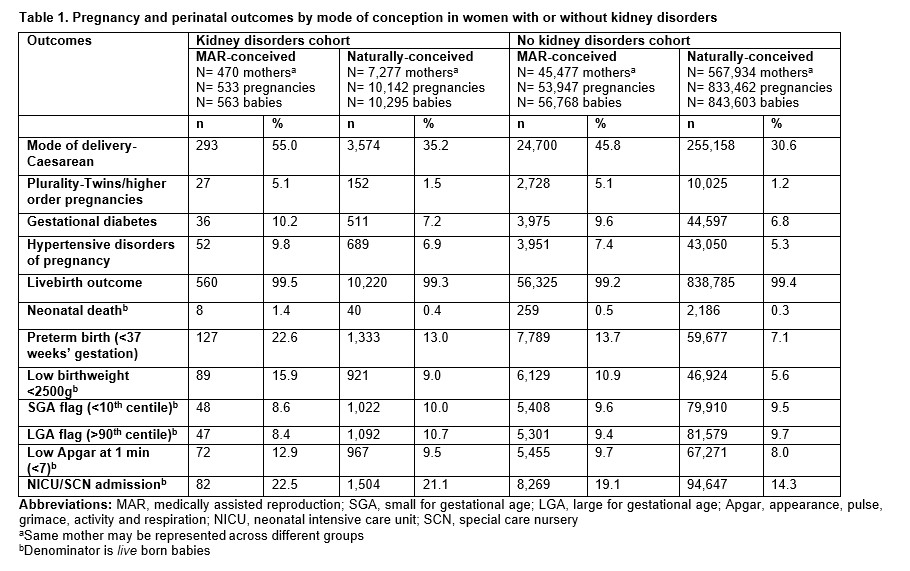SOMANZ Poster Presentation Australasian Diabetes in Pregnancy Society and Society of Obstetric Medicine Australia and New Zealand Joint Scientific Meeting 2025
Medically assisted reproduction and pregnancy outcomes in women with kidney disorders: An Australian population-based study (#156)
Background: Medically assisted reproduction (MAR) accounts for ~7% of births in NSW/ACT1. Kidney disorders affect up to 3% of pregnancies2 and may impair fertility3. We investigated MAR use and pregnancy outcomes in women with kidney disorders.
Methods: Using linked Australia and New Zealand Assisted Reproduction Database, hospital, Medicare, pharmaceutical, and perinatal records (NSW/ACT, 2009–2017)1,4, births to women with kidney disorder diagnoses before delivery were identified. Conceptions were classified as MAR or naturally-conceived.
Results: Of 911,229 babies born during the study period, 10,858 were born to 7,634 mothers with kidney disorders. Among these, 563 babies (5.2%), born to 470 mothers, were MAR-conceived. From 2009-2017, the proportion of MAR-conceived births remained steady (~5%) in women with kidney disorders, while it increased from 5% to 7% among those without kidney disorders. Kidney disorder diagnoses were similar between the groups: renal tubulo-interstitial disease (62% MAR versus 73% naturally-conceived), urolithiasis (37% versus 27%) and other kidney/urinary disorders (5% versus 6%). Among mothers with kidney disorders, those using MAR were older (median 33 years (IQR 30-37) versus 29 (IQR 24-33) naturally-conceived). Common MAR treatments were fresh (34%) or frozen (29%) embryo transfer and clomiphene citrate (27%). Among women with kidney disorders who conceived using MAR, 55% experienced a caesarean delivery and 23% had a preterm birth (Table 1).
Conclusion: The percentage of births to women with kidney disorders who conceived using MAR appears similar to all women giving birth. Further research is needed to understand the effectiveness of MAR and perinatal outcomes in this group.

- Choi SKY, Venetis C, Ledger W, Havard A, Harris K, Norman RJ, Jorm LR, Chambers GM. Population-wide contribution of medically assisted reproductive technologies to overall births in Australia: temporal trends and parental characteristics. Hum Reprod. 2022 May 3;37(5).
- Srialluri N, Thavarajah S. CKD in reproductive-aged women: a call for early nephrology referral and multidisciplinary care. BMC Nephrology. 2024/12/03 2024;25(1).
- Bhaduri M, Sarris I, Bramham K. Female Infertility in Chronic Kidney Disease. Diagnostics (Basel). Oct 15 2023;13(20).
- Chambers GM, Choi SKY, Irvine K, et al. A bespoke data linkage of an IVF clinical quality registry to population health datasets; methods and performance. Int J Popul Data Sci. 2021;6(1).